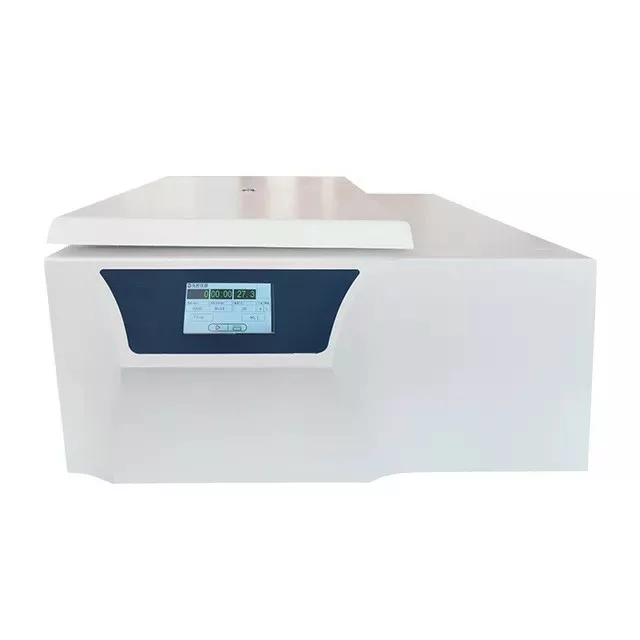Enhance Laboratory Precision with a Low Speed Refrigerated Centrifuge KLC/RR/6
In the realm of scientific research and diagnostics, maintaining the integrity of sensitive samples during separation is paramount. The Low Speed Refrigerated Centrifuge KLC/RR/6 is a specialized piece of laboratory equipment designed to meet this critical need. Combining moderate speeds with precise temperature control, this centrifuge is essential for laboratories that require gentle handling of temperature-sensitive samples, such as blood, cells, and proteins. Whether in clinical settings, research labs, or industrial applications, the Low-Speed Refrigerated Centrifuge offers unparalleled performance and reliability.
What is a Low-Speed Refrigerated Centrifuge?
A Low-Speed Refrigerated Centrifuge is a laboratory instrument that spins samples at low to moderate speeds, typically between 300 and 6,000 revolutions per minute (RPM), while maintaining a controlled, cool temperature environment. The refrigeration system, which usually operates within a temperature range of -20°C to 40°C, ensures that heat-sensitive biological samples are preserved during the centrifugation process. This combination of low-speed operation and refrigeration is particularly important for applications involving delicate samples that could be damaged or degraded by excessive centrifugal forces or temperature fluctuations.
Key Features of Low-Speed Refrigerated Centrifuges
- Temperature Control: The integrated refrigeration system allows precise temperature regulation, crucial for maintaining the stability and integrity of temperature-sensitive samples during centrifugation.
- Moderate Speeds: Operating at lower speeds, these centrifuges are ideal for separating larger or more fragile particles, ensuring that samples are processed gently and without damage.
- Versatile Rotor Options: Low-Speed Refrigerated Centrifuges are compatible with a variety of rotors, including swinging-bucket, fixed-angle, and microplate rotors, making them adaptable to a wide range of sample types and volumes.
- Digital Interface: Many models feature an intuitive digital control panel, enabling precise adjustments of speed, temperature, and run time, along with real-time monitoring of the centrifugation process.
- Safety Mechanisms: Equipped with safety features such as automatic imbalance detection, lid locking systems, and emergency stop functions, these centrifuges ensure safe operation, even in high-throughput laboratories.
- Quiet Operation: Despite their powerful performance, Low-Speed Refrigerated Centrifuges are designed to operate quietly, minimizing noise in the laboratory environment.
- Compact and Durable Design: With a design that maximizes bench space while ensuring durability, these centrifuges are built to withstand the rigors of daily laboratory use.
Benefits of Using a Low-Speed Refrigerated Centrifuge
- Protection of Sensitive Samples: The refrigeration system in these centrifuges is vital for preserving the integrity of temperature-sensitive biological samples, such as enzymes, proteins, and blood components, during centrifugation.
- Gentle Separation: The moderate speed settings allow for the separation of delicate samples without subjecting them to excessive centrifugal forces that could cause damage or loss of sample quality.
- Versatility Across Applications: Low-Speed Refrigerated Centrifuges are used in a variety of laboratory settings, from clinical diagnostics to research and industrial applications, due to their adaptability and precision.
- Enhanced Sample Integrity: By maintaining a controlled temperature, these centrifuges prevent heat-induced degradation of samples, ensuring that results are accurate and reliable.
- Increased Efficiency: With features like programmable settings and multiple rotor options, these centrifuges enhance workflow efficiency, enabling laboratories to process a higher volume of samples in less time.
- Longevity of Equipment: The robust design and advanced safety features ensure that Low-Speed Refrigerated Centrifuges offer long-term, reliable operation, even with frequent use.
Applications of Low-Speed Refrigerated Centrifuges
- Clinical Diagnostics: In medical laboratories, Low-Speed Refrigerated Centrifuges are indispensable for the separation of blood components, such as plasma and serum, under controlled temperature conditions to prevent hemolysis or other forms of sample degradation.
- Cell Culture Processing: These centrifuges are widely used in cell biology labs for harvesting cells from culture, where gentle handling is required to maintain cell viability and function.
- Molecular Biology and Biochemistry: For applications like protein purification, DNA/RNA isolation, and enzyme assays, Low-Speed Refrigerated Centrifuges ensure that samples remain stable and active throughout the separation process.
- Pharmaceutical Research: In drug development and quality control, these centrifuges are used to prepare and purify compounds, ensuring that pharmaceutical products meet rigorous standards of purity and efficacy.
- Environmental Science: Researchers use Low-Speed Refrigerated Centrifuges to analyze environmental samples, such as soil and water, where maintaining the integrity of biological and chemical components is essential for accurate results.
- Food and Beverage Testing: In the food industry, these centrifuges are employed to analyze ingredients and additives, particularly when temperature-sensitive components must be separated for quality control purposes.
How to Choose the Right Low-Speed Refrigerated Centrifuge
Selecting the right Low-Speed Refrigerated Centrifuge depends on several factors, including the specific requirements of your laboratory applications. Consider the maximum speed (RPM), temperature range, rotor compatibility, and sample capacity when making your choice. Additionally, evaluate the ease of use, digital control features, and the availability of safety mechanisms to ensure the centrifuge meets your laboratory’s needs. Opting for a model from a reputable manufacturer that provides reliable customer support and warranty options can further enhance the longevity and performance of your centrifuge.
Conclusion
A Low-Speed Refrigerated Centrifuge is an essential tool for laboratories that require precise, gentle, and temperature-controlled separation of samples. Whether you’re working in clinical diagnostics, molecular biology, or environmental science, this centrifuge ensures that your samples are processed with the utmost care, preserving their integrity and ensuring accurate, reliable results. With its combination of moderate speeds and refrigeration, a Low-Speed Refrigerated Centrifuge offers unmatched versatility and performance, making it a valuable addition to any laboratory.
Explore our comprehensive selection of Low-Speed Refrigerated Centrifuges today and find the perfect model to enhance your laboratory’s efficiency and precision. For expert guidance in selecting the right centrifuge for your specific needs, reach out to our knowledgeable team.





Reviews
There are no reviews yet.